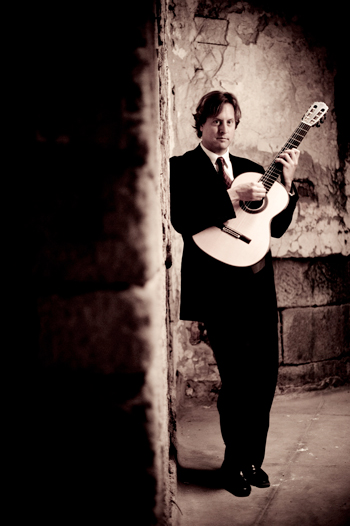by Jarrett Hoffman

Ten minutes later, his guitar-accordina arrangement of Tears for Fears’ popular song was born. He and Julien Labro would rehearse it the next morning for fifteen minutes before performing it on WGBH and again that night in Roxbury. “We thought, it’ll really get it ready for the concert if we play it live on the radio,” Vieaux said with a laugh during a recent conversation. “It was kind of crazy, but things happen that way. It came out of professional necessity.”
The arrangement would go on to close out the duo’s 2014 Cleveland International Classical Guitar Festival performance and cap off their 2016 album Infusion — which also includes works by Piazzolla, Metheny, and Brouwer.
For the 2017 edition of CICGF, the Grammy Award-winning Jason Vieaux is taking things in a different direction. On Friday, June 9 at 7:30 pm at the Cleveland Institute of Music’s Mixon Hall, he will open the Festival with a solo program of Sor, Bach, Ponce, Ginastera, and Morel.
“It was inspired by my desire to get back to larger-form, standard-repertoire pieces, and things that involve more classical and less folkloric or jazz music for the next concert season or two,” Vieaux said. “But after twenty-plus years, programming becomes a little more instinctive.”
He described Fernando Sor’s third bagatelle from Mes Ennuis as a Mozartian palate-cleanser. “Some of his best pieces are these little jewels that you have to really search for in collections of bagatelles or even etudes. This one just has a very lovely, pristine kind of classicism to it. I think it’s a nice way to open the recital.”
The guitarist’s choice of the Prelude, Fugue, and Allegro, BWV 998 — “a masterpiece, even by Bach’s lofty standards” — dates back to this past January, when he was invited to perform an all-Bach recital at the Arizona Bach Festival. “I’d never been asked to do that before,” he said. “I had offered it as a possible program over the years, but no one ever took me up on it. That was a great experience for me, just to work on his music for a month and give that concert. So this piece is back in my mind again. I teach it to at least two students every year between CIM and Curtis — but there’s teaching it, and then there’s reliving it again as a performer. It’s been really fun.”
Jumping forward a century, the middle of the program consists of two sonatas by Manuel Maria Ponce, “Mexicana” and “Meridional,” both of which Vieaux recorded for his 2001 album Ponce, M.M. “It was honestly a total gut thing to include these. Sometimes you just feel like, ‘You know what? I want to play a Ponce sonata again. It’s been too long.’ That’s a boring answer, but that’s actually how it came about.”
Vieaux added that Ponce “would’ve been considered a Modernist during his time — there are some spicy dissonances here and there in his music. But in hindsight he’s really an even mix of Modernist, Classicist, and late Romantic, and he uses a lot of folk elements, as well.”
The guitarist’s recording of Ginastera’s Sonata can be heard on Oberlin Music’s 2016 album celebrating the composer’s centennial. “I felt that since I put the time into learning it, I might as well start performing it live,” Vieaux said. He’ll close with Jorge Morel’s pop-influenced Choro and Danza in e, juxtaposing two Argentine-born composers. “These pieces are a little bit more the kinds of things that I’m known for — I love playing South American music.”
Also known for his wide-ranging repertoire, Vieaux said his approach to absorbing something new depends on the composer. “Usually within a few days, you can figure out what their individual language is. Everybody has a history, everybody has influences. If you know the music of Stravinsky really well, you’ll be pretty familiar with Ginastera’s language in the Guitar Sonata.”
The guitarist spoke about the influence that improvisation can have on classical musicians. “I learned to improvise within a jazz context just after I graduated from CIM. I did that entirely on my own, just from listening to lots of records and forming my own style. Improvising can be quite illuminating because it shows you what real, in-the-moment expression is. Then you can bring that spirit into your classical playing as well.”
Vieaux’s solo album Play won the 2015 Grammy Award for Best Classical Instrumental Solo. Has life changed for him since then?
“The daily life thing is pretty much the same. I think a Grammy gives legitimacy to rock and pop musicians and opens things up. It carries so much more cachet for them. But in classical music and jazz, you can win several Grammys, and you’re not going to be performing on network television or anything.
“I would say that the Grammy has given me more confidence to approach different composers. It’s like, if I don’t ask them now, then I’m never going to do it. The classical music scene is 99% a grassroots, making-your-own-way type of thing, especially if you’re not connected to any music business structures. Most folks like me are just putting a career together piece by piece over many years.”
Audience members are welcome at L’Albatros Restaurant (11401 Bellflower Road in Cleveland) for an after-concert dinner starting at 10:30 pm. I asked Vieaux about CICGF’s disclaimer for the meal (“Individuals pay their own tab”), and we closed our conversation laughing and wondering — is there a story behind that? (Probably a good one.)
Tickets for Jason Vieaux’s recital are $25. Pay at the door or reserve online.
On Wednesday, we will speak with David Russell and Colin Davin.
Photo by Tyler Boye
Published on ClevelandClassical.com June 5, 2017.
Click here for a printable copy of this article


